🩺 ATORVASTATIN 10mg + ASPIRIN 75mg: The Dual Shield for Heart Health
Overview
Atorvastatin 10mg + Aspirin 75mg is a fixed-dose combination (FDC) medication used primarily for the prevention of cardiovascular events, especially in patients with a history of atherosclerosis, stroke, or myocardial infarction (heart attack). By combining a statin and an antiplatelet agent, it offers dual protection: reducing cholesterol levels and preventing blood clots.
Components and Mechanism of Action
1. Atorvastatin (10 mg)
-
Class: HMG-CoA Reductase Inhibitor (Statin)
-
Primary Action: Lowers LDL cholesterol (“bad cholesterol”) by inhibiting the enzyme responsible for cholesterol production in the liver.
-
Additional Benefits: Slight increase in HDL (“good cholesterol”), mild reduction in triglycerides, and potential plaque stabilization in blood vessels.
2. Aspirin (75 mg)
-
Class: Antiplatelet Agent (NSAID)
-
Primary Action: Inhibits cyclooxygenase-1 (COX-1), reducing the production of thromboxane A2—a substance that causes platelets to clump.
-
Clinical Benefit: Prevents the formation of blood clots in arteries, reducing the risk of stroke and heart attack.
Indications
-
Primary prevention in high-risk patients with diabetes, hypertension, or hyperlipidemia.
-
Secondary prevention after acute coronary syndrome (ACS), stroke, or transient ischemic attack (TIA).
-
Post-angioplasty or stenting to reduce thrombotic complications.
Dosage and Administration
-
Typical Dose: One tablet once daily (preferably at night).
-
Route: Oral, with or without food.
-
Note: Should be taken consistently at the same time each day.
Benefits
✅ Comprehensive cardiovascular protection
✅ Single-tablet convenience, improving patient adherence
✅ Cost-effective in long-term therapy
✅ Proven efficacy in major clinical trials for reducing CV morbidity and mortality
Side Effects
Common:
-
Gastric irritation (due to aspirin)
-
Muscle pain or weakness (from statin)
-
Headache
-
Nausea
Serious (less common):
-
Liver enzyme elevation
-
Rhabdomyolysis (rare muscle breakdown from statins)
-
Gastrointestinal bleeding or ulcers (risk from aspirin)
Monitoring: Periodic liver function tests, creatine kinase (CK) levels, and checking for signs of bleeding.
Precautions
🚫 Contraindicated in:
-
Active liver disease
-
History of hemorrhagic stroke or peptic ulcer
-
Hypersensitivity to either component
⚠️ Caution advised in:
-
Elderly patients
-
Those with renal impairment
-
Patients on concurrent anticoagulants or NSAIDs
Drug Interactions
-
Increased bleeding risk with warfarin, heparin, or other NSAIDs
-
Enhanced statin toxicity with certain antibiotics or antifungals
-
Alcohol: May increase liver-related side effects
Patient Counseling Tips
-
Report unusual bruising or bleeding immediately.
-
Avoid excessive alcohol intake.
-
Take medication consistently and do not stop without consulting your doctor.
-
Lifestyle modifications (diet, exercise, smoking cessation) enhance treatment efficacy.
Conclusion
Atorvastatin 10mg + Aspirin 75mg provides synergistic protection for the heart and brain, making it a cornerstone therapy in patients at risk for or recovering from cardiovascular events. When taken responsibly, it significantly reduces long-term complications and improves quality of life.
Note: This information is intended for educational purposes and should not replace professional medical advice. Always consult a healthcare provider for personalized guidance.
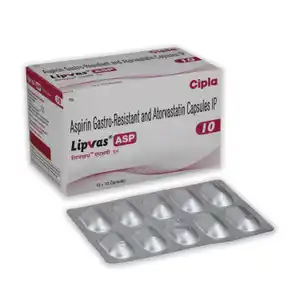
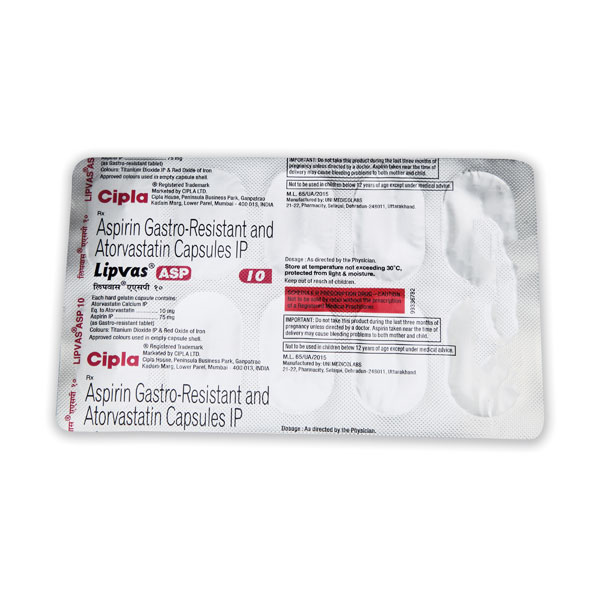
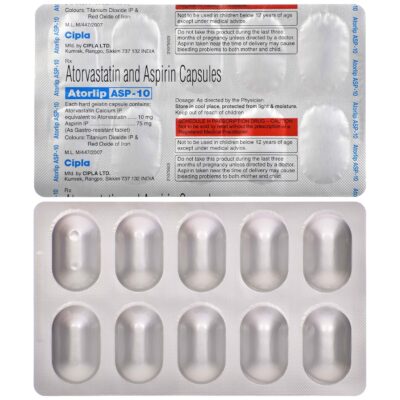
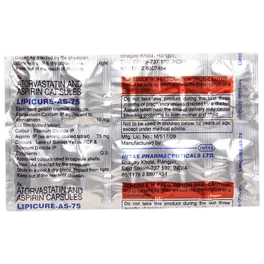
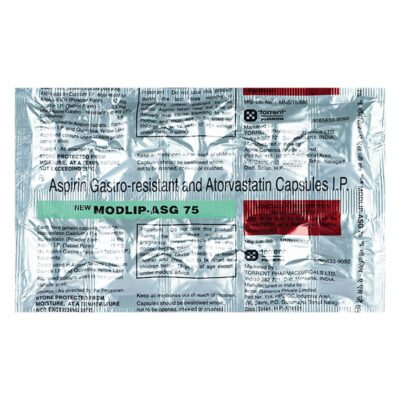
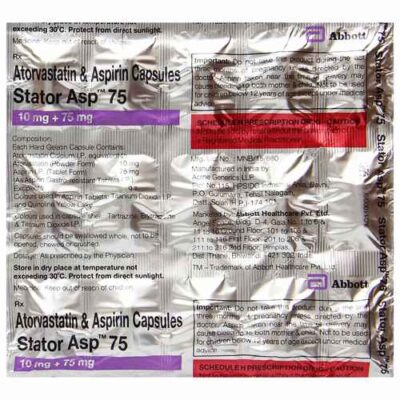
Reviews
There are no reviews yet.